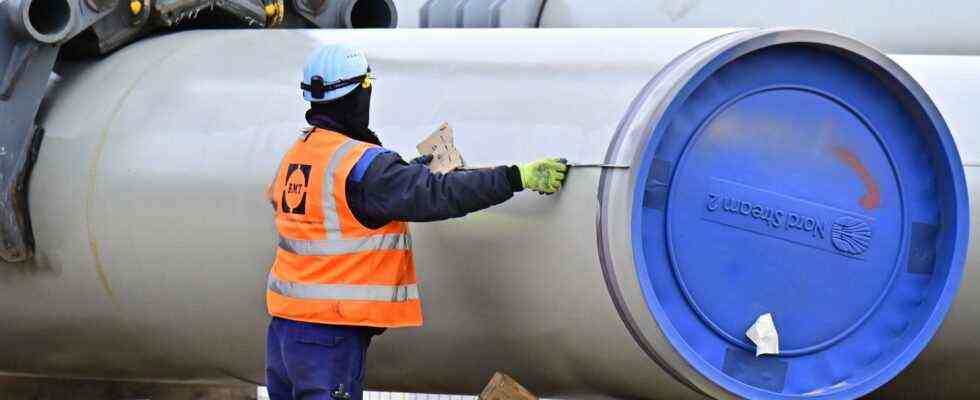Status: 16.12.2021 3:33 p.m.
The Federal Network Agency does not expect a quick decision on the controversial Nord Stream 2 pipeline. The start could thus be delayed by months. The gas reserves are meanwhile at a historically low level.
Commissioning of the controversial Baltic Sea gas pipeline Nord Stream 2 is not expected to be possible in the first half of 2022. “There will be no decisions in the first half of the year,” said the President of the Federal Network Agency, Jochen Homann, with a view to the necessary approval. Nord Stream AG has initiated the requested re-establishment of a German subsidiary.
“She announced that, and we interrupted the certification process,” said Homann. This will continue if the relevant documents are submitted in a verifiable manner. “We don’t have that in our hands”. After the examination, the whole thing goes to the European Commission, which also has plenty of time to deal with Nord Stream 2. The head of the Bonn authority emphasized today that there will be no decisions in the first six months of the coming year.
Nord Stream 2 AG wants to found a German subsidiary
The operating company Nord Stream 2 AG, based in Switzerland, which financed and built the pipeline, also confirmed that it would establish the subsidiary in Germany requested by the regulator. She wanted to “ensure compliance with applicable laws and guidelines”. She did not want to comment on the duration of the proceedings. Nord Stream 2 AG is half owned by the Russian Gazprom Group and a consortium of European energy suppliers.
The Federal Network Agency announced in November that it had temporarily suspended its approval procedure for the twin tubes between Russia and Germany. Without certification, no gas may flow through the pipeline towards Germany. Otherwise there is a risk of high fines. It had come to the conclusion that certification of an operator could only be considered if it was organized in a legal form according to German law, she justified her decision. Because only then can the authorities control him at all and may impose conditions on him if necessary.
If the regulator finally gives the green light, the result should be submitted to the EU Commission for comment. This can take up to four months for the review. After that, the Federal Network Agency would again have two months for a possible final certification. In addition to the integration of the connection line into the German market area, the role of Gazprom is also a point of contention. Because according to European energy law, pipeline operators and gas suppliers cannot be the same company. Supply networks should be independent of the actual energy market and grant non-discriminatory access.
Advance in the US Congress for sanctions failed
The USA, but also Poland and Ukraine, do not want the line that connects Russia directly with Germany through the Baltic Sea to go into operation. A possible dependency of Germany and Europe on Russian gas is also criticized against the background of the conflict between Russia and Ukraine. You are also counting on a change in Germany’s course by the new federal government.
Several countries have now called on the German federal government to crush the German-Russian project. Chancellor Olaf Scholz (SPD) must use the “important instrument” of the pipeline in talks with Russia, said Ukrainian President Volodymyr Selenskyj yesterday at the EU summit with five former Soviet republics. Member countries such as Poland, Lithuania and Latvia also asked Germany to use the Baltic Sea pipeline as a means of pressure against Russia in order to defuse the situation between Russia and Ukraine.
In the US Congress, the opponents of the pipeline failed for the time being with a push for stricter sanctions laws. They did not succeed in having a corresponding change in the law included in the legislative package on the defense budget (NDAA). It was passed yesterday without the relevant addition to Nord Stream 2. With the change, US President Joe Biden should be deprived of the possibility of arbitrarily issuing exceptions to American sanctions for reasons of national security.
Gas storage facilities in Germany at an all-time low
The 1230 kilometer long double tube was completed on September 10th. The pipeline was financed half by Gazprom and half by the five companies OMV, Wintershall Dea, Engie, Uniper and Shell and cost the investors more than ten billion euros. The pipeline is to deliver 55 billion cubic meters of gas annually from Russia to Germany and other countries in Europe. According to the operating company, this can supply 26 million households.
According to the Russian government, the commissioning of the line could help ease the situation on the gas market in Europe. Most recently, prices had climbed to a record level. In Germany, the gas storage reserves are currently at a historically low level, according to the Energy Storage Initiative (INES). The level had “fallen below the 60 percent mark”, said managing director Sebastian Bleschke the “Handelsblatt”.
At the moment, there is a strong utilization of the storage facilities. “Since the actual winter is still ahead, the comparatively low storage reserves should certainly be handled carefully,” said Bleschke. Otherwise, the memory level is very low in February. In order to avoid a bottleneck, Trading Hub Europe GmbH has launched a special tender for the procurement of natural gas.

